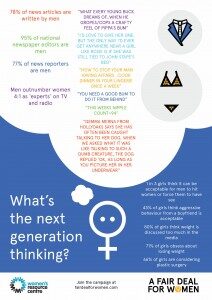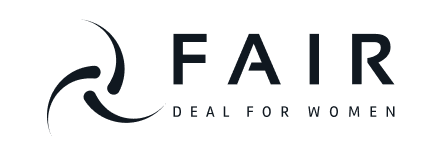
****Vital updates to this page coming soon! Look out for ‘Fair Deal for Women Report – Part 3: Women Speak Out on Media, Attitudes, Power and Human Rights’****
When you walk into a news agents, what do you see? News articles about men, written by men. Half naked women. Gossip columns about how much weight or cellulite female celebrities have gained.
We consume the news put in front of us, but we so rarely stop to think how harmful it can be, or how it informs our attitudes whether obviously or subliminally. What you might not have noticed is that 90% of front page articles are written by men, as well as 78% of all other newspaper articles, while women comprise only 24% of news subjects globally, and men outnumber women 4:1 as ‘experts’ on TV.
With 75% of people getting their political news and views from TV, and a considerable percentage getting theirs from newspapers and radio, the silence of women has a massive effect on how women are perceived and how public debate is shaped.
In fact, a global study found that 46% of global news content reinforces gender stereotypes, while only 6% challenges gender stereotypes.
Furthermore, evidence for the Leveson Enquiry found that pornographic imagery of women is increasingly common in the media. Worryingly, it also found that sexualised images of women accompanied stories about violence, rape, and even murder of women.
As women and girls are depicted as sexualised objects, while men are depicted as authoritative, power figures, it has a massive effect upon attitudes towards women. 80% of 11-21 year olds think there is too much discussion in the media about women’s weight, but 71% still say that they would like to lose weight.
Similarly, 76% of young women say that girls are judged harshly for sexual behaviour that is seen as acceptable in boys – while at the same time seven out of 10 girls over 13 report being sexually harassed by boys at school. There is still no provision in the curriculum to discuss these issues of inappropriate imagery, sexual assault and violence.
Meanwhile, girls lack confidence in their ability in maths and science, and this stereotyping in education has real affects upon career choices, which affect how much women earn.

click for full size infographic
Sources
Women’s organisations provide information and campaigns to challenge stereotypes and negative attitudes that affect girls, as well as clubs and activities to build self-esteem and confidence. Some groups work to tackle bullying and harassment in schools and to promote positive images, while others work with girls on sexual safety, self-harm issues and eating disorders.
What can Parliament do?
- Regulate the media on harmful, pornographic, and sexually objectifying images and other content
- Introduce, as a compulsory element of the curriculum, Sex and Relationships Education in schools
- Provide activities to remove gender stereotyping in education
Sources
Share on FacebookShare on Twitter
